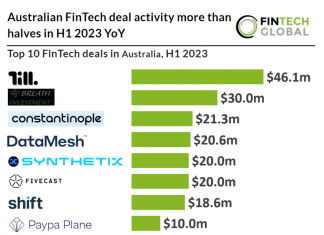As another year starts, it is the time to look ahead and attempt to predict what is to come and the biggest trends for the WealthTech sector in 2024.
WealthTech in 2023 was dominated by the advancement and adoption of AI, particularly generative AI. Our recent review of WealthTech in 2023 emphasized leaders’ eagerness to explore and leverage AI technology for transforming operations. If one thing is clear from the predictions for 2024, it is that it is likely to be more of the same. Fredrik Davéus, the CEO and co-founder of financial analytics API developer Kidbrooke, said, “[The big trend will be] even more use cases and use for generative AI. Also finding combinations and integrations with existing tech to get even more capabilities out of it.”
With the hype around the technology, the generative AI market is growing rapidly. Its market size is projected to reach $66.2bn in 2024, according to data from Statista, and will grow at a CAGR of 20.80% to reach a value of $207bn by 2030. The appeal of the technology has even been noted by investors, with 73% of UK investors believing that AI chatbots could offer reliable financial advice in the future, with 42% of investors age between 18 and 34 having already tapped the technology to support their investment decision making.
Radomir Mastalerz, the co-founder and CEO of easy-to-use and affordable wealth management platform WealthArc, agreed that the biggest trend of the year will be AI. He said, “Fast adoption of AI will continue. We will see the first serious large-scale applications of generative AI in wealth management.”
This is already evident, with investment giant Blackrock recently revealing a new generative AI tools for its staff and clients to be released in January 2024. Similarly, Morgan Stanley previously unveiled an internal model that is powered by generative AI and designed to help its advisors with admin and research tasks. The goal of the tool is to help advisors spend more time focused on clients. JP Morgan Chase is another big name to engage with generative AI and is currently working with US regulators to ensure the correct controls are in place for new generative AI pilot projects it has in the works. It is clear generative AI is set for another big year.
Generative AI is capable of a variety of use cases, but firms will need to start small on specific areas and expand it from there. According to a survey from EY, wealth and asset management firms are primarily interested in using the technology for data ingestion to help drive alpha generating strategies, with 21% of respondents marking this as one of their three priorities for the technology. It was followed by investment operations and financial advice (19%) and middle-office operations (16%). Other use cases were client onboarding (15%), marketing and client acquisition (15%) and back-office operations (14%).
Banesh Prabhu, CEO at wealth management platform provider IntellectAI, added, “In 2024, the most significant trend will be the advancement and deeper integration of AI within our solutions. At IntellectAI, we’re committed to harnessing the potential of artificial intelligence to enhance customer experiences and share knowledge more effectively through Generative AI. This approach is not just about improving our services; it’s about reshaping the landscape of wealth management by embedding sophisticated AI-driven insights into every aspect of our client interactions.”
Challenges in 2024
While generative AI is taking the world by storm, Davéus believes it still poses some challenges in the coming year. The main one revolves around how to use the technology in a compliant and responsible way. He said, “The potential is too big to ignore but there are still a lot of challenges with respect to privacy and other regulations I would say.”
With the impressive capabilities of generative AI, it has got regulators taking an interest to ensure people are protected. Even tech leaders are cautious over its use. Last year, 1,100 tech leaders, including Elon Musk and Steve Wozniak, signed a letter calling for a pause on creating more powerful tools than current generative AI models.
Regulations around AI are set to rise. Joe Biden called for new standards around AI, the UN launched a new board to focus on AI governance, and the EU finalised its AI Act to bring greater controls to the technology. There are bound to be more developments in 2024 around the world and firms will need to balance adopting the technology and potential restrictions.
However, challenges in 2024 will not be entirely focused on AI. WealthArc’s Mastalerz sees the main challenge of the year being efficiency. He said, “WealthTech is expensive, wealth management processes are complex. More and more wealth is held by the mass affluent. This segment is still underserved.”
Banesh sees there being a number of challenges throughout the year, but the biggest will be the need for better financial advice. He said, “The upcoming year presents a unique set of challenges, primarily in elevating the quality of financial advice. This encompasses improving customer experiences, enhancing intelligence, and ensuring robust control and compliance measures. The real test for the industry will be in leveraging technology to address these challenges. This is crucial for financial advisors and wealth management firms to scale up and secure a competitive edge in the market. At IntellectAI, we recognize these challenges and are dedicated to providing solutions that enable our clients to thrive in this dynamic environment.”
How optimistic are WealthTechs?
To finish off, FinTech Global asked WealthArc, Kidbrooke and IntellectAI how they felt about the coming year and whether they were optimistic for wealth management in 2024. They were each very excited for the year ahead and its potential for growth.
Mastalerz said, “[We are] very optimistic! The digitalization of wealth management in 2024 will speed up. The Great Wealth Transfer to Millennials and Baby Boomers has already started. New heirs are demanding faster digitalization than the previous generation.”
Davéus said, “For us I’m very optimistic as we have a strong pipeline and many interesting conversations ahead of us going into 2024. The market in general I think will be somewhat affected by the overall slowdown in the economy, although I think we are past the worst when it comes to rates and the economic growth. Still, it will take some time to digest and cycle through rises in unemployment etc before there can be acceleration again.”
Banesh said, “I am very optimistic about the prospects for 2024. We anticipate that continuous efforts by governments and regulatory bodies to manage inflation and interest rates, coupled with the potential de-escalation of geopolitical tensions, will create a more favourable macroeconomic environment. This setting should particularly benefit emerging markets, offering substantial opportunities for business growth in an environment ripe for wealth creation.”











